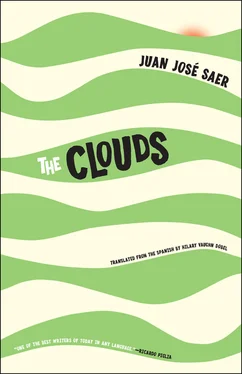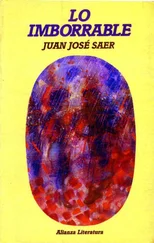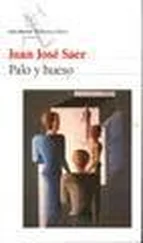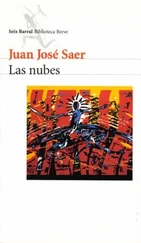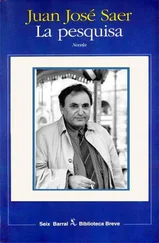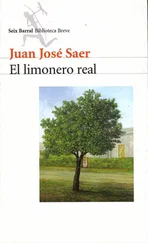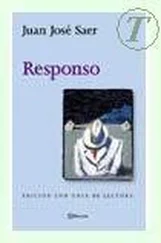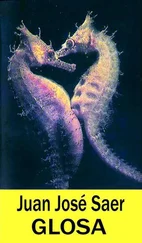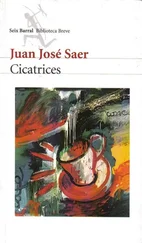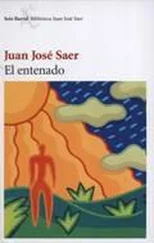But there was something yet more curious in young Parra’s sudden, if slow and limited, activity. It continued to hold my attention, and I took note of it in light of that golden rule which Dr. Weiss had instilled in me: According to him, all of a madman’s actions, as trivial or absurd as they seem, are significant. The fist that Prudencio held closed stubbornly and forcefully for so many months, which he only deigned to open from time to time so that his nails might be cut (and not before snatching up an invisible breeze with his other hand using the same gesture, though a little gentler, as we make to trap a fly in the air), that fist that had taken the strength of several men to open after so much time, had relaxed for some mysterious reason once our convoy left the city, and his two hands had begun to effect the precise but unhurried movements I have just described. As I believe has also been said, because of the flood we had to go north for two days until we met a bend in the river shallow enough to let us cross, so that, once on the opposite shore, we could journey in the other direction along the river’s western bank, returning, so to speak, to our point of departure. That situation gave me the opportunity to confirm the most surprising detail in Prudencio’s behavior: Since his fist relaxed as we left the city, once we started to approach our original point of departure before veering west to trek through the desert, would his hand-movements cease and his fist close up once more, its strength apparently renewed? While we kept to the outskirts of his native city, as we had plotted our route, his fist tightened obstinately, but the moment we began to seek dry land to the west, his fist relaxed, his body straightened in the bunk, and the hand movements, which had been so familiar to the students of Zeno beneath the Athenian arcades two thousand years ago, brought to light by unexpected means, promptly returned. A single explanation seemed possible to me: Every unique but fragmentary place in the world is embodied in its totality, so for young Parra, his birthplace contained the universe in all the enigmatic complexity he had tried to decipher with the help of frenetic and chaotic reading, until one day he lost his mind. So, as we moved away from the scene of that destructive experience, the terror diminished, but when we drew near it again, proximity to the city, steeped with such a painful past, caused it to worsen. ( To this philosophical explanation of Doctor Real’s, let us offer a simpler and, more importantly, likelier counter: that what moved away and came closer with the trip’s ups and downs, and what had driven that poor young man mad, was not the enigmatic universe or anything of that sort, but, as is patently obvious, his own family. Note, M. Soldi.)
It has already been noted that, to reach a latitude nearly equivalent to our starting point, we had to travel four days, which under normal circumstances would have been a quarter of our journey. And so, as the fifth day dawned, we started westward, determined, searching for the dry land that would allow us to go south. Within hours, we advanced into the flattest, emptiest, most wretched part of the plain. A southerly wind, frigid and persistent despite the limpid sky — not a single cloud in sight — pummeled us across our left flank as we made our way inland, shaking the dried grasses along the ground, winter-thinned and gray. We traveled all day, bearing away from the water into high desert, and when we camped at dusk under a low sun — enormous, round, and red, almost touching the horizon’s edge, accentuating contours with a brilliant red halo — I had the impression, more sad than terrifying, that we had arrived at the very heart of isolation. Above the lowlands slipping quickly into the night, it seemed to me, for a few moments, that we were the only living things to writhe beneath that crushing and disdainful alien sun. I probed all along the circular horizon with my gaze, detecting no other motion but the trembling inclinations of the wind-whipped grass, no sound but the whistling of that icy blast from the south. And though I knew the desert swarmed with life, not just animal but solitary, nomadic human life, it was the inhuman wind in that landscape that made me shudder. Never, not before or after that journey, have I received, as if I were ruler of the barren land, the enormous red sun and, some hours later, the overwhelming stars, such clear tidings about the true state of all things growing, creeping, fluttering, pulsating, and bleeding, twitching in grotesque contortions, within the fiery engine that, for some reason, chance had placed in motion. We lit a modest fire, as brush was scarce in those parts, and, after we ate, I got into bed partly-dressed to ward off the cold and, before falling asleep, read a few pages of Virgil by candlelight.
For leagues and leagues, in every one of its parts, the desert remains identical. Only the light changes: The sun recurs, rising in the east, climbs slow and regular to its zenith and then, with the same ritual precision with which it has reached the apex of the sky, descends to the west and, finally, having grown enormous and red, gradually fading and cooling, flaring with a brightness perhaps familiar in infinite space but foreign here below, then sinks to the horizon and disappears, covering everything with night’s viscous blackness until, a few hours later, it reappears in the east. Were it not for the changing light and color of that perpetual turning, a rider crossing the plain would think himself to be always riding in the same point in space, in a futile, slightly oneiric sham of motion. (On cloudy days, that illusion is perfect and a little unsettling.) The rhythmic sounds of displacement — in cart, in carriage, on postal coach or horse, repeating and identical for long stretches, despite the regularity, if not the absence, of the terrain’s features — seem also to infinitely repeat the same moment, as if time’s colorless ribbon, stuck in the groove of the wheel (or the who-knows-what that displaces it) shimmers motionless in place, suspended and unable to rest because of its essence of pure change. Such monotony numbs. As a rider moves forward, things might often happen that are specific to a place, but they come to adapt themselves to that illusion of repetition; if at first they succeed in attracting the traveler’s gaze and even his curiosity, past a certain point they become more than familiar and float, phantomlike, far outside experience, and, at times, even beyond knowledge. The life that swarms among the tall, even grasses, for example, pulled out of their quiet by the passing of a cart or horseman, that diverse and vibrant life that could occupy a naturalist’s whole existence — the traveler with no other concern but to leave behind those poor, abandoned fields as soon as possible might find his interest awakened at its first appearance, but after a few hours it blends into the most uniform monotony. If a hare leaps into his path, his eye will always capture the same image of the jump, and he will always see the short-tailed hindquarters a little more sharply than the rest, springing up, while he will just make out the tips of the ears in a flash as the head dives into the grass. In the case of partridges, it will always be a pair, plumage neither gray nor green nor blue, and with a metallic sheen, that comes flying side by side, male and female, almost level with the grasses, to disappear into them again and take up their short, slow flight on a light breeze a few meters away. League after league, the same caracara will appear, wheeling over the same skeleton, and the same wild horses on the same winter migration will graze in herds of fifteen or twenty, tiny and docile, along the horizon. A peculiarity in the scenery that suddenly appears, introducing diversity, repeats itself over the leagues and ultimately there is nothing but the same field as in the beginning, a field whose novelty fades almost at once. Like the sea, the plain varies only at its edge; its interior is like an undifferentiated nucleus. Barren and measureless, when it produces some imperfection in itself, that imperfection always gives the illusion (or the perhaps the true impression) that it is the same one, again and again. When something out of the ordinary happens, its passing is so intense and vivid that, whether brief or lasting, its evidence will always seem too much, and will trouble us.
Читать дальше
